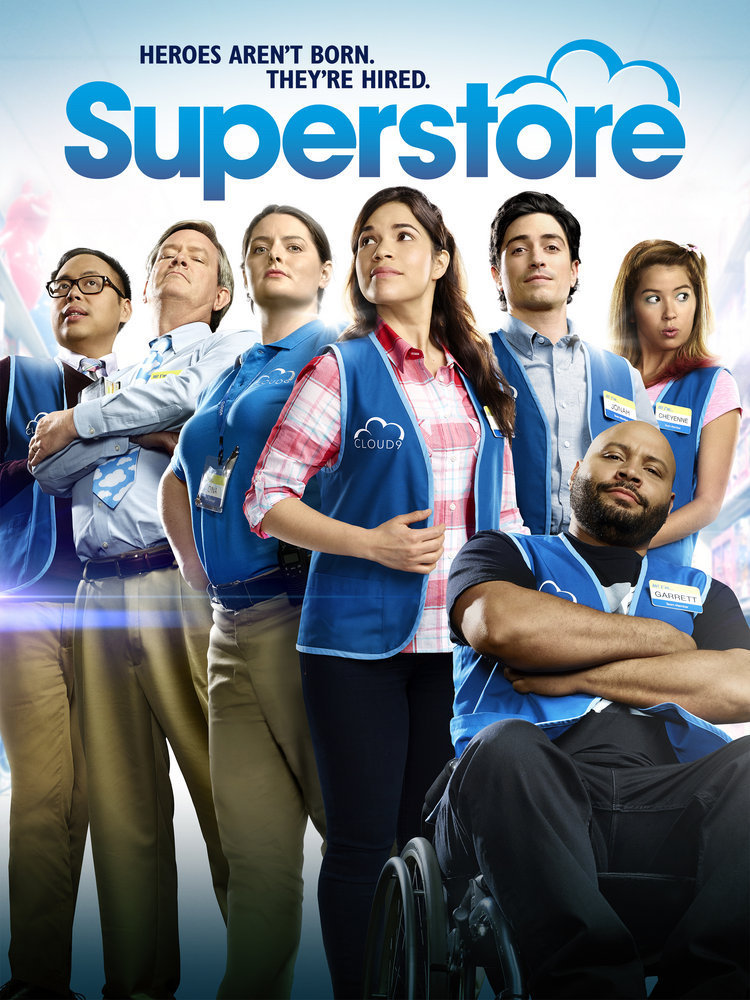Season 2, Episode 21: 'Tornado'
Genre: Comedy
Follows the lives of a team of workers at a Cloud 9 grocery store.
Superstore is a sitcom which airs on NBC in America and ITV 2 in England. It was created by Justin Spitzer, and stars America Ferrera as Amy, and Ben Feldman as Jonah. Season 1 began in 2015, and the third season is currently airing in America.
Analysis:
Class
Class can be seen through how characters talk, dress, where they work and/or where they study. It can be seen to create hierarchy.
What is most evident in this show is that all of the characters are of a working class since they work at the superstore. This is shown through their appearances, as they all wear the same blue vest as a work uniform, and similar trousers. They can only be distinguished through their t-shirts, make-up, and hair styles, which show something about each of their personalities. The character of Cheyenne is seen here in a blue t-shirt with a rainbow on it, whilst wearing colourful make-up and having pink streaks in her hair. Compared to the other characters she is therefore more brightly dressed, so could be seen as having a less serious personality than them, although they are of similar class.
Class is also present through the character's behaviour. For example, in this episode, Tornado, the team are more concerned about who is going to be fired, so much so that they are unaware a tornado is headed right towards the store until it actually hits them.
A hierarchy is also present therefore, since the store is run by a manager with managerial staff, and other employees who work below them. The managerial staff are at no risk of being fired, but still become involved in the troubles of employees below them, whilst the manager is seen as being spineless and cannot make decisions for himself. Therefore, the hierarchy is shown as being dysfunctional, but this is where the show gets most of its humour from.
Agency
Agency is often used to analyse representation, as it is to what extent characters who are diverse are proactive, having the ability to create, drive, and change the plot.
Since the manager, Glenn, is unable to make any decisions on his own, he lacks agency because he is always asking for help from the rest of the team, and will not stand up for himself in front of his own boss, but allows himself to be pushed into making a decision. This is unusual because he is a white male, which is who typically drives the plot.
However, many of the characters agree to make pacts with Mateo over different factors such as they are all of the same race, sexuality, or are fans of a certain singer so that if one of them is fired, they will all leave together. When this happens to a worker Mateo has made a pact with, he decides not to stick to it, but instead to keep his job while the other person is let go, creating a plot because after the tornado it is uncertain if this will still be the case.
At the end of the episode it is shown that the store is destroyed by the tornado, which along with the storyline about employees getting fired, makes evident how dependent the characters are on the store. Without the store it is clear that many of them would lose a lot, but maybe in the next episode it could be interesting to see if this causes more of the characters to be more proactive.
Review:
I decided to watch this show because of how it appears to show the working class, much in the same way as The Office. Therefore, the characters in this show seem to mock typical supermarket workers, and are portrayed in an exaggerated manner. For example, the character of Glenn the manager constantly panics excessively for comic effect. This was funny but I think could become annoying after a while, because he lacks agency which affects the rest of the characters and therefore the plot is sometimes slow. The plot seemed to rely on coincidence as well, such as when Glenn was praying to the different Gods, and after several tries finally believes he is successful at stopping the storm because he has picked the right God, when in reality the storm has just passed by the store. The most impressive thing about the show was how there were about six stories that were developed and carried from other episodes in only twenty minutes and it was not confusing even though I had not seen any of the previous episodes. I also liked the cliffhanger at the end when the store was destroyed, because it showed how much the employees depend on the store, along with the storyline of some characters being fired. Overall, I don't think I would continue watching this show since it was interesting to see how the working class were depicted, but it was a bit too exaggerated, the plot was too slow, and not enough of the characters had their own agencies.




Comments
Post a Comment